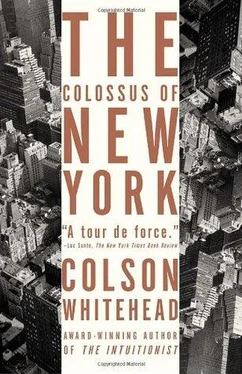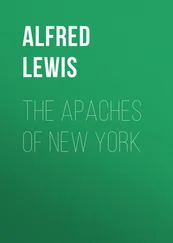Consider what all your old apartments would say if they got together to swap stories. They could piece together the starts and finishes of your relationships, complain about your wardrobe and musical tastes, gossip about who you are after midnight. 7J says, So that’s what happened to Lucy — I knew it would never work out. You picked up yoga, you put down yoga, you tried various cures. You tried on selves and got rid of them, and this makes your old rooms wistful: why must things change? 3R goes, Saxophone, you say — I knew him when he played guitar. Cherish your old apartments and pause for a moment when you pass them. Pay tribute, for they are the caretakers of your reinventions.
Our streets are calendars containing who we were and who we will be next. We see ourselves in this city every day when we walk down the sidewalk and catch our reflections in store windows, seek ourselves in this city each time we reminisce about what was there fifteen, ten, forty years ago, because all our old places are proof that we were here. One day the city we built will be gone, and when it goes, we go. When the buildings fall, we topple, too.
Maybe we become New Yorkers the day we realize that New York will go on without us. To put off the inevitable, we try to fix the city in place, remember it as it was, doing to the city what we would never allow to be done to ourselves. The kid on the uptown No. 1 train, the new arrival stepping out of Grand Central, the jerk at the intersection who doesn’t know east from west: those people don’t exist anymore, ceased to be a couple of apartments ago, and we wouldn’t have it any other way. New York City does not hold our former selves against us. Perhaps we can extend the same courtesy.
Our old buildings still stand because we saw them, moved in and out of their long shadows, were lucky enough to know them for a time. They are a part of the city we carry around. It is hard to imagine that something will take their place, but at this very moment the people with the right credentials are considering how to fill the craters. The cement trucks will roll up and spin their bellies, the jackhammers will rattle, and after a while the postcards of the new skyline will be available for purchase. Naturally we will cast a wary eye toward those new kids on the block, but let’s be patient and not judge too quickly. We were new here, too, once.
What follows is my city. Making this a guidebook, with handy color-coded maps and minuscule fine print you should read very closely so you won’t be surprised. It contains your neighborhoods. Or doesn’t. We overlap. Or don’t. Maybe you’ve walked these avenues, maybe it’s all Jersey to you. I’m not sure what to say. Except that probably we’re neighbors. That we walk past each other every day, and never knew it until now.


THEY’RE ALL BROKEN somehow, sagging down the stairs of the bus. Otherwise they would have come here differently. The paparazzi do not wait to take their picture. Barricades do not hold back the faithful. This is the back entrance, after all.
IN THE PARKING berth it is anticlimactic. A man in goggles records the time of arrival. The baggage handler huffs into his palms, one job closer to punching out. Thousands of arrivals every day, they won’t stop coming. Different people but all the same. They try to sneak by with different faces but it is no use. They step down the grooved steps, clutching items and the attendant lugs the bags out of the bin, looking for handles. They get excited and jostle: is someone going to steal their bags. They have all heard the stories. One of them has a cousin who came here once and was a victim of street crime. He had to have money wired so he could get home and that was the last time their clan went to New York. There is a thing called three card monte out to get you. They have all heard the stories and they all come anyway. The bags thud on concrete and get taken.
NO MATTER their hometowns, no matter their reasons for sliding cash through ticket windows, on the bus they are all alike. They get on. By the driver they take stock, shoving receipts into pockets and bags. There are some seats in the back. They all want to sit alone. You have never been the first on the bus and had your pick. People have theories about window seats and aisle seats and which areas are safer in the event of a crash. He is unaware that his duffel hits each person on the head as he passes. Is this seat taken, he says, and his measure is taken by his neighbor. Scowls come easy. It only takes five minutes for them to ease into lasting discomfort. If only she could breathe through her mouth for the next thousand miles. She practices a technique. At the next stop people arrange bags and jackets on the empty seats beside them and avoid eye contact or feign sleep when the new pilgrims try to find seats.
THERE IS NOT much to occupy them on the highways except intermittent foreshadowings. An industrial park, the confident skyline of a smaller city than the one named on their ripped tickets. Signs on the highway count down miles, sometimes heartening. More furtive things dart from the headlights to escape glimpses. Across three states the empty bottle of juice rolls up and down the bus between shoes and bags. No one claims ownership. Responsible parties pretend not to hear. That is surely a wig two rows up. They try out new positions for their legs. One drawn up and the other wedged into the footrest. Both feet almost in the aisle until the third person trips on them. He has long legs and deserves special rights. The tall man drives his knees into the seat in front of him, squeezing up a chimney. Hers is the only seat that won’t recline. The lever has been ripped off and every inclination of her neighbors summons jealousy. Each new combination of limbs might be the one that unlocks the vault of comfort and then sleep. Instead, parts that don’t matter fall asleep before their brains. Legs, feet. As they cross state lines, license plates change colors.
SOMETHING HAPPENS TO the bags up there in the baggage racks. When you go to get something out of them they are inexplicably heavier, as if they repacked themselves when you weren’t looking. Zippers won’t close, hang open in half smiles. Innocuous imperfections in the highway have consequences. The cap of the shampoo loosens itself. Shampoo oozes onto garments, a drop a mile. The smell of shampoo seeps through canvas and reminds whole rows of showers denied them. He falls asleep on the window and when he wakes notices a gray cloud of grease, indentation on a tinted pillow. She thinks she has slept a long time but it has only been ten minutes. Hardly closer.
THANK GOD for the white detachable headrest slip-covers, an invention that saves us from germs. Pat pending. Without gratitude the bus speeds past the factory that manufactures them. The guy in the next seat won’t take a hint. She sends signals, glancing at her book, nods or grunts noncommittally but he keeps on yapping. Finally closing the book to submit to prattle. If this loaf of bread lasts for the next three days, he will have nine dollars and seventy-five cents when he gets there. Someone is eating fried chicken, there can be no mistake. The smell of fried chicken makes Rows 8 through 15 hungry and envious until someone cons open a sticky window. The bathroom disinfectant is a genie periodically loosed from its bottle, all out of wishes. Hold it for as long as possible before braving that place. For ten miles of interstate a man inspects his face in the bathroom mirror. Is he actually going to start fresh in a new place with that face of his. If you can endure the verdict of the fluorescent lighting the city will be no problem. He takes a piss and tries not to splash at every latest jolt. Occasionally self-abuse. Through the tiny window left open for ventilation the world blurs. Cool reassurances from moist towelettes. The latch slides to vacant. Then the staggering return down the aisle to find the seat shrunk while you were away.
Читать дальше














